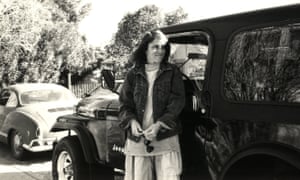In an unexpected burst of enthusiasm in The Trouble With Being Born, EM Cioran declares that everything by Emily Brontë “has the capacity to overwhelm me. Haworth is my Mecca.”
I feel the same about the American writer Joy Williams, it’s just that this Mecca is not so easy to locate. Now 72, she seems to spend her time in Key West, Tucson and points in between. The stories drift all over the US, with occasional forays south of the border. In one set in Tallahassee, Florida, a young woman called Audrey is telling her friend Tommy about Wuthering Heights. “Everything’s in that book,” she says. To which Tommy replies: “Tell me the whole book.” That, I guess, is what I’m supposed to do here. But how to tell the whole of a 500-page collection of stories spanning more than 40 years? Especially when I really want to just exclaim, “Oh, Oh, OH!” in a state of steadily mounting rapture.
So let’s start with a variant of that. Overhearing an adopted baby’s first attempt as speech as “uh-oh”, the narrator of Lorrie Moore’s A Gate at the Stairs concludes that “she already knew both the sound and language of things going wrong”. Things go terribly wrong in Williams’s world, as wrong as they do in Flannery O’Connor. In Congress, to take a mid-period example, Jack, a forensic anthropologist, is asked to examine a hand discovered in the stomach of a shark off the Gulf Coast of Florida. His conclusions could hardly be more drastic: “The shark was most certainly attracted to the rings on this hand. This is a teen’s hand. She was small, perhaps even a legal midget, and well nourished. She was a loner, adventurous, not well educated and probably unemployed. Odds are the rings were stolen. She would certainly have done herself a favour by passing up the temptation of those rings.”
Then Carl, a student of Jack’s and a keen hunter, gives him four cured deer feet with the suggestion that he make a lamp out of them. This seems a fine idea to Jack who not only makes the lamp but also gets into hunting, with bow and arrow. Unfortunately, on one of these expeditions, he falls from a tree and one of his own arrows “passes through his eye and into his head like a knife thrust into a cantaloupe”. Severely disabled, as one might expect, “he tended to resemble, if left to his own devices, a large white appliance”.
Carl devotes himself to the invalid’s care while Jack’s wife, Miriam, develops an intimate friendship with the lamp – despite a few disagreements. “The lamp had witnessed a smattering of Kierkegaard and felt strongly that thought should never be confused with existence.” Adapting to this new situation, the four of them – Carl, Miriam, Jack and the lamp – take a road trip together. The car breaks down and they end up in a small town where there’s a museum of taxidermy – after which things get very weird indeed.
It’s a moot point whether Williams’s stories have gotten weirder or less weird (in terms of form, not just content) since sustained immersion in them so thoroughly recalibrates notions of what a story might be that faithful transcription of the real takes on the quality of full-blown dementia – and vice-versa. All the while – and this is crucial – Williams displays the observational sensitivity and subtleness of less wayward masters of the genre. Even a glimpse can yield a full portrait: “She was tall and dishevelled and looked the very picture of someone who recently had ceased to be cherished.”
So after Dwight, the proud owner of a restored but rusty Ford Thunderbird, takes the car to a garage with his wife, Lucy, it seems quite natural for the mechanic’s prognosis to morph into something way beyond an estimate of parts and labour: “Rot like this cannot be stayed. This brings us to the question, What is man? with its three subdivisions, What can he know? What ought he do? What may he hope? Questions which concern us all, even you, little lady.” Reconciled to the car’s terminal lack of roadworthiness Dwight installs it in their living room.

There’s a bunch of other stuff I haven’t mentioned: that Dwight had decided Lucy would be his wife when he was 25 and she was a four-month-old baby; that one of Dwight’s old girlfriends had recently suffered the amputation of a leg – which “was in ashes in a church garden, waiting for the rest of her” – and that there’s a vignette of a snorkelling trip in a cove so overpopulated with tourists that “the fish could scarcely be seen for all the suntan oil floating in the water”.
Oh, and there’s a dog, naturally. A thesis will one day be written on all the dogs in Williams’s work. In one of the earliest stories a mother and daughter are desperate to take home a dog advertised for adoption because, as the mum explains, the kid lost her own dog the week before. “Kicked to death by one of the horses. Must have broken every bone in his fluffy little body.”
On the up side, Turner, a dog that has fallen overboard on a ferry crossing, is miraculously plucked from the waves and reunited with its grateful owners – who then announce that it’s not Turner after all and leave the boat to heckles. Witnessing the rejection of this poor creature, a witness concludes: “I never saw a dog looked more like another dog in my life.”
So, yes, light turns to dark and dark to light but the distinction is hard to sustain. Three quick examples: “Suddenly, there was a deceptive light in the darkness. A light that blackly reminded the lonely of the darkness.” “The sky had pieces of black running through it, like something that had died during the night.” “Daylight was just beginning to flourish on the city of Jacksonville. It fell without prejudice on the slaughterhouse, Dairy Queens and courthouses, on the car lots, Sabal palms and a billboard advertisement for pies.”
Is there perhaps an echo of the famous description of snow falling at the end of Joyce’s story The Dead here? And when Constance descends the stairs after a long anticipated visit to the lighthouse – “She did not know, exactly, what it was she had expected but it had certainly not been 18 black heavy-duty truck batteries” – is there maybe a deadpan allusion to Virginia Woolf?
I can’t be sure but I can say, with confidence, that as a writer of dialogue her only peer is Don DeLillo (a fan, naturally). Take this little exchange, from the title story, between a visitor to a mental hospital and a patient who tells her about a room-mate:
“‘She attacked this guy. She gouged out one of his eyes with a spoon.’
‘She gouged it out?’
‘I didn’t think it could be done, but boy, she knew how to do it.’”
At which point, since we’re hearing echoes and dropping names, we may as well go real big and cite G Wilson Knight’s essay King Lear and the Comedy of the Grotesque, for while Williams’s imaginative world is ravaged with “existential horror”, it is simultaneously redeemed by ravishing hilarity. As a character decides at the end of the story Fortune: “Things had to be funny.” Or as Mr Muirhead explains to his daughter when she asks if they were really selling postcards of the grotesquely preserved mummies at a cemetery museum in Mexico: “Yes, sweetie pie, they were. In this world there is a postcard of everything. That’s the kind of world this is.”
Geoff Dyer’s latest book, White Sands, is published by Canongate. The Visiting Privilege is published by Tuskar Rock (£16.99). Click here to buy it for £13.93

View all comments >